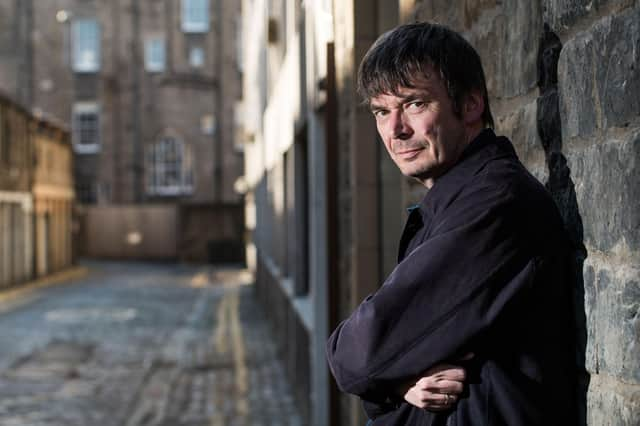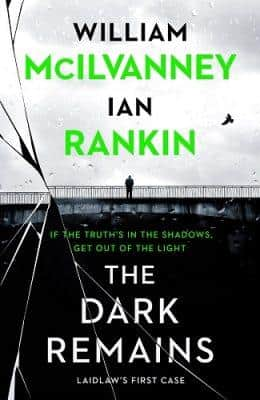Book review: The Dark Remains, by William McIlvanney & Ian Rankin


What, precisely, is this novel? When William McIlvanney died in 2015, he left behind various unfinished manuscripts, and his estate commissioned Ian Rankin to complete one of the most intriguing possibilities: after Laidlaw, The Papers Of Tony Veitch and Strange Loyalties there was to be another volume. It is not a collaboration, since that would require the use of a Ouija board. There is a tradition of one noted author being asked to complete unfinished works by a figure of similar stature. Wilkie Collins declined to complete Dickens’ The Mystery Of Edwin Drood (others did, variously unsuccessfully) and Collin himself has his unfinished Blind Love finished by Sir Walter Besant. It is in some ways an homage and in some ways an epitaph.
McIlvanney almost pre-empted this on his blog, where the put up various pieces of occasional writing. The front page of it has a handwritten note. It reads – and this is classic McIlvanney in the range of references – “In one of his essays (The Hero as Poet, Dante; Shakespeare) Thomas Carlyle insists on the inevitably fragmentary nature of both creativity and life, and his thought is echoed and endorsed almost a century later by Fernando Pessoa: “instead of the poem or the opera omnia, just the beginning and end of something lost – the disjecta membra which, as Carlyle said, are what remains of any poet or of any man. Or woman."
Advertisement
Hide AdMcIlvanney continues: “These notes are, I suppose, my disjecta membra”. Disjecta membra means “scattered fragments”, and the quote, slightly misquoted from the Roman poet Horace, is often parsed as meaning if lines of poetry were rearranged, you might still be able to recognise the poet. So is this some form of disjecta membra?


But having thought a great deal about it, I must resort to music. Rankin, of course, often uses lyrics and album titles in naming his own novels. My taste is somewhat different, but I would propose “Ian Rankin’s 40 Variations On A Theme By William McIlvanney”.
Perhaps the strangest thing about the novel is that it is a prequel to the Laidlaw trilogy, being set over a week in October 1972. Laidlaw is a detective sergeant, not a detective inspector. In some ways this is an origin story. How does Laidlaw become Laidlaw? He certainly arrives with a certain reputation as an outsider and not the world’s best team player; but at the same time a person of integrity as well as hunches. The Laidlaw here is nevertheless recognisable. He is a kind of flâneur, drifting through the streets, going on buses, staying in slightly run-down hotels despite having a wife and children. Obviously, he chain smokes. There are some grace notes to this, such as Laidlaw having copies of “Unamuno, Kierkegaard and Camus” on his desk. It also has the philosophical rigour of the originals. “If we could work back to those origins, maybe we could stop crimes happening in the first place… it’s not cops like you and me we need so much as sociologists and philosophers”. But with the undercutting wit that typified the books, his colleague says “I’d like to see Socrates patrolling the Gallowgate on an Old Firm night”.
The murder which triggers the action is that of a lawyer, Bobby Carter who is a man of dubious ethics and right hand man to a local gang boss. Readers of McIlvanney’s books will recognise the name Cam Colvin. He has been stabbed multiple times and left in the vennel off a howff, stabled multiple times. There are other gang tags graffitied on the wall. Colvin’s great rival, again a call-back to previous books, John Rhodes, seems to be an obvious suspect, but would he want a turf war? There are multiple misdirections that seem more like Rankin than McIlvanney, and the revelation about the murderer was fairly easy to guess, but satisfying nonetheless. There are also a few references for the aficionados, such as a fleeting mention of Tom Docherty from The Kiln and Eck Adamson from The Papers Of Tony Veitch. Milligan and Laidlaw are still antagonistic.
Tonally, it seems to be in the right key from the opening word. “All cities are riddled with crime. It comes with the territory. Gather enough people together in one place and malignancy is guaranteed to manifest in some form or other”. It’s not quite the famous “city of the stare”, but it’s still good. More problematic is the amount of period detail. Bible John is mentioned on the first page, there are premium bonds and references to the Troubles, and there are various brands and makes of car (which mean absolutely nothing to this reader). There is a Jekyll and Hyde reference which I suspect may have Rankin’s fingerprints all over it.
Nonetheless The Dark Remains is both enjoyable and thought-provoking. I did wonder if the actual McIlvanney ur-text might ever be released, so one can sift through which piece of the jigsaw went where. One curiosity is that there is a scene where the phrase “the dark remains” occurs. Then it struck me that the French word noir can mean dark as well as black. Is this a wink that tartan noir remains?
Advertisement
Hide AdThe Dark Remains, by William McIlvanney and Ian Rankin, Canongate, £20. Ian Rankin is appearing at the Edinburgh International Book Festival today
A message from the Editor:
Thank you for reading this article. We're more reliant on your support than ever as the shift in consumer habits brought about by coronavirus impacts our advertisers.
If you haven't already, please consider supporting our trusted, fact-checked journalism by taking out a digital subscription at https://www.scotsman.com/subscriptions